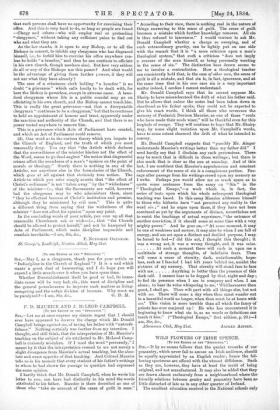F. D. MAURICE AND J. McLEOD CAMPBELL. [To THE EDITOR
OF THE "SPECTATOR."1 Sui,—Let me at once express my sincere regret that I should ever have appeared to deserve the charge which Mr. Donald Campbell brings against me, of taxing his father with "untruth. fulness." Nothing certainly was further from my intention. I thought, and still think, that the interpretation of Mr. Maurice's teaching on the subject of sin attributed to Mr. McLeod Camp- bell is curiously mistaken. If I used the word "perversely," I meant by it that the interpretation seemed to me not merely a slight divergence from Maurice's actual teaching, but the abso- lute and exact opposite of that teaching. And Colonel Maurice tells us in his memoir that every student of his father's writings to whom he had shown the passage in question had expressed the same opinion.
I hardly think that Mr. Donald Campbell, when he wrote his letter to you, can have had distinctly in his mind the words attributed to his father. Maurice is there described as one of those who "take no account of the sense of guilt in man."
"According to their view, there is nothing real in the nature of things answering to this sense of guilt. The sense of guilt becomes a mistake which further knowledge removes. All sin is thus reduced to ignorance." I would venture to ask Mr. Donald Campbell whether a charge so sweeping, and of such extraordinary gravity, can be lightly put on one side- with the remark that it is "a mere criticism upon a man's. theological system," that such a criticism " does not imply a censure of the man himself, as being personally wanting in the sense of sin." The distinction here drawn seems to me to involve a contradiction. How a theological teacher can consistently hold that, in the case of other men, the sense of guilt is all a mistake, and that sin is, in fact, ignorance, and at the same time that in his own case sin is a very important matter indeed, I confess I cannot understand.
Mr. Donald Campbell says that be cannot suppose Mr. Shairp to have misunderstood the drift of what his father said- But he allows that unless the notes had been taken down in shorthand as his father spoke, they could not be expected to- give his exact words. I think all those who reverence the memory of Frederick Denison Maurice, as one of those " souls who have made their souls wiser," will be thankful even for this loophole of escape. They will continue to hope that Mr. Shairp may, by some slight variation upon Mr. Campbell's words, have to some extent obscured the drift of what he intended to convey.
Mr. Donald Campbell suggests that "possibly Mr. Ainger understands Maurice's writings better than my father did." I need hardly say that I disclaim any such pretensions. There- may be much that is difficult in those writings ; but there is also much that is clear as the sun at noonday. And of this- last, I am confident that Maurice's apprehension and constant enforcement of the sense of sin is a conspicuous portion. Pas- sage after passage from his writings crowd upon my memory as I write. Perhaps you would allow me so much space as to- quote some sentences from the essay on " Sin " in the " Theological Essays,"—a work which is, in fact, the- series of texts upon which his whole subsequent theological teaching was based. In this essay Maurice addresses himself to those who hitherto have " not perceived any reality in the word sin ;" and he urges upon them, if they have not been convinced as yet by the arguments of divines, nevertheless not to resist the teachings of actual experience, "the entrance of another conviction, if it should come at some time with a very mighty power." And he goes on,—" At some moment, it may be one of weakness and sorrow, it may also be when I am full of energy, and am set upon a distinct and decided purpose, I may- be forced to feel—I did this act, I thought this thought ; it was a wrong act, it was a wrong thought, and it was mine._ At such a moment there will rush in upon me a multitude of strange thoughts, of indefinite fears. Then will come a sense of eternity, dark, unfathomable, hope- less, such as I fancied I had left years behind me, amidst the- pictures of my nursery. That eternity will stand face to face- with me Anything is better than the presence of this dark self. I cannot bear to be dogged by that, night and day to feel its presence when I am in company and when I am alone ; to hear its voice whispering to me, Whithersoever thou goest, I shall go. Thou wilt part with all things else, but not with me. There will come a day when thou canst wander out in a beautiful world no longer, when thou must be at home with me.' This vision is more terrible than all which the fancy of priests has ever conjured up ! He who has encountered it is beginning to know what sin is, as no words or definitions can teach it him." (" Theological Essays," first edition, p. 23.)—I am, Sir, &c.,
































 Previous page
Previous page